
About Us
The Standards Commission is an independent body whose purpose is to encourage high ethical standards in public life through the promotion and enforcement of Codes of Conduct for councillors and those appointed to the boards of devolved public bodies.
- What We Do
- Who We Are
- Standards Commission Meetings
- Audit and Risk Committee
- Who We Cover
- Our Service
- Policies & Procedures
- FAQs
-
News and Blog
- Health and Social Care IJBs - Standards Officer Appointments
- Survey on the Hearing Process
- Feedback on the Hearings Survey
- Advice Note for Councillors on ALEOs
- Updated Standard Presentation to Elected Members
- New Convener Appointed
- Consultation on the Councillors' Code of Conduct
- How Councils Work - Follow Up Report Nov 2016
- New Member of the Commission - Mr Michael McCormick
- Appointment of New Commission Member
- @StandardsScot
- Updated Standard Presentation to Board Members
- Application of Article 10 of ECHR at Hearings of the Standards Commission
- Consultation on Draft Advice Note on Application of Article 10
- Advice for Councillors on How to Declare Interests
- A Councillor's Responsibilities to the Council as a Member of the Public
- Standards Commission's Regional Roadshows
- Revised Guidance on the Councillors' Code of Conduct
- Advice Note for Councillors on the Application of Article 10 of the ECHR
- Festive Closure
- January 2018 Professional Briefing
- Consultation on draft Advice Note for Councillors on Distinguishing Between Strategic and Operational Management
- Member vacancy
- Administrative Assistant Vacancy
- Flowchart on Making Declarations of Interest
- April 2018 Professional Briefing
- Proposed changes to the Councillors' Code of Conduct
- Standards Commission - BSL Plan
- New Standards Commission Member appointed
- Advice Note for Councillors on Distinguishing between their Strategic Role and any Operational Work
- Health & Social Care Integration Joint Board Members' Workshop 24 Sept 2018
- BSL Video on role of the Standards Commission
- British Sign Language Event reminder
- Response to Committee on Standards in Public Life's Review of Ethical Standards in Local Government in England
- June 2018 Professional Briefing
- Amended Councillors' Code of Conduct
- Amended Guidance on the Councillors' Code of Conduct
- Annual Report 2017/18
- Regional Roadshows on the Councillors' Code of Conduct
- Draft British Sign Language (BSL) Plan - consultation
- Standards Commission - Role and Remit (BSL Video)
- British Sign Language (BSL) Plan
- Sept 2018 Professional Briefing
- Interim Suspensions
- Survey of Members of Devolved Public Bodies
- Standards Commission Member Recruitment
- Standards Update December 2018
- Change of Venue - Regional Roadshow
- Assisting Constituents Card
- Further Analysis of Responses to Survey of Members of Devolved Public Bodies
- New Standards Commission Member appointed
- Hearings Flowchart
- Standards Update March 2019
- Ethical Standards Act Section 19(6) Policy
- Standards Update July 2019
- Appeal Judgement
- Annual Report 2018-19
- Standards Update September 2019
- Interim Suspensions
- Advice Note for Members of IJBs
- Draft Strategic Plan 2020-24
- Standards Update December 2019
- Standards Officers' Workshop
- Suspension Guidance
- Postponement of Standards Officers' workshop on 23 March 2020
- Hearing in Stornoway on 18 March 2020 postponed
- Standards Commission - remote working arrangements
- Standards Update March 2020
- Amended Advice Notes
- Standards Update July 2020
- Standards Commission Hearings
- Advice Note for Public on Councillors’ Code
- Standards Update September 2020
- Disqualification
- Scottish Government Consultations on the Councillors' Code of Conduct and the Model Code of Conduct for Members of Devolved Public Bodies
- Direction on the Outcome of Investigations
- Recruitment for a new Convener
- Committee on Standards in Public Life Public (CSPL) Consultation: Standards Matter 2
- Standards Update December 2020
- Business Manager & Caseworker Recruitment
- Appeal Decision
- "You're on Mute!"
- Direction on the Eligibility of Complaints
- BSL video on Councillors' Code of Conduct and Guidance - Advice for Members of the Public
- Pause before you post!
- Standards Update March 2021
- Striking a balance!
- Why Transparency Matters
- Standards Update June 2021
- Why Respect is Key
- To share or not to share!
- Consultation on Revised Guidance
- New Convener
- Annual Report 2020/21
- Holding Hearings in Public
- Standards Update September 2021
- Standards Commission Decision to Disqualify Councillor Upheld by Court
- Vacancy - New Member of the Standards Commission
- Respect is Still Key
- Standard Training Presentations on the Revised Codes of Conducts
- New Codes of Conduct Issued
- Honesty and Trust
- Standards Update December 2021
- Audit Scotland’s Section 22 Report on the Ethical Standards Commissioner - Statement from the Standards Commission for Scotland
- Leadership
- New Standards Commission Member
- Similar names, different roles.....
- Outcome of Appeal to Court of Session
- Standards Update March 2022
- Social Media: Avoid the Pitfalls!
- Summary of Councillors and Monitoring Officers Survey Responses
- Surveys of Standards Officers and Board Members of Public Bodies
- Representation
- Glossary of commonly used words and terms
- Leadership and Culture
- What is Lobbying?
- Objectivity
- Her Majesty the Queen
- Annual Report 2021/22
- Why duty is still relevant
- Progress of Investigations Direction
- Standards Update September 2022
- The Ethical Standards Commissioner’s Public Consultation on its draft Investigations Manual
- Freedom of Expression
- Recruitment of two new Commission Members
- Effective Relationships
- Standards Update December 2022
- Ethical Standards Commissioner - Job Opportunities
- Festive Office Hours
- Blog: Quasi-Judicial and Regulatory Decision-Making
- The Committee on Standards in Public Life's Report "Leading in Practice"
- Appointment of new Ethical Standards Commissioner
- Social Impact Pledge
- The Auditor General’s Report on the Ethical Standards Commissioner: Statement from the Standards Commission for Scotland
- The Ethical Standards Framework
- Polarisation in Politics
- Standards Commission’s Response to Scottish Government’ Electoral Reform Consultation
- New Standards Commission Member
- Multiple Roles: Conflicts of Interest?
- Standards Update March 2023
- New Standards Commission Member - Helen Donaldson
- Distinguishing between lobbying and helping constituents or service users
- Preferential Treatment
- Standards Commission's Response to the Scottish Government's Consultation on the Review of the National Outcomes
- Making a complaint
- Standards Update June 2023
- Consultation on Section 31 of the Local Government (Scotland) Act 1973
- Sanctions
- Confidentiality
- Volunteering at The Yard
- Eligibility Direction
- Scottish Government’s Consultation on Mandatory Training for Councillors on their role in the Planning System
- Standards Update September 2023
- Dispensations Granted for Members of Cairngorms National Park Authority and Loch Lomond and the Trossachs National Park Authority
- When do the Codes of Conduct apply?
- New Advice Note for Members of College Boards
- Standards Commission’s Draft Strategic Plan 2024/28
- Standards Update December 2023
- Key Principles of Public Life
- Standards Commission / Improvement Service - joint webinars
- Standards Commission Convener and Member Vacancies
- Updated Guidance on the Councillors' Code of Conduct
- Why have Codes of Conduct for Board Members?
- Improvement Service and Standards Commission Briefing Note for Councillors on the Right to Access Information
- Parliament’s Finance and Public Administration Committee's call for views on Scotland’s commissioner landscape
- Standards Commission's Strategic Plan 2024-28
- Standards Update March 2024
- Elected Member Safety
- New E-Learning Module: What is Confidential Information?
- Vacancies
- Accessibility statement for the Standards Commission for Scotland
- Use of Personal Information
Standards Commission's Policies & Procedures
This section contains information about some of the Standards Commission's policies and procedures. Please note, however, the Rules that govern how the Standards Commission conducts Hearings about alleged breaches of the Codes of Conduct are contained in the Hearing Process Guide and Rules, which can be found on the Hearing Rules page of the website.
The Equality Act 2010, which came into force in 1 October 2010, obliges public bodies to assess and review policies, procedures and practices to ensure there is no unlawful discrimination or disadvantage as a result of their impact against any individual. It is a way of ensuring and showing due regard has been paid to the general duties under the 2010 Act. Equalities impact assessments can also be used to promote or improve equality of opportunity. The Standards Commission undertake equalities impact assessments when any policies, procedures and practices are introduced or amended.
Standing Orders
The Standards Commission's Standing Orders outline the arrangements that cover the conduct of business and how the organisation will discharge its functions.
Code of Conduct for Members of the Standards Commission
Members of the Standards Commission are subject to their own Code of Conduct, which sets out the standards of conduct that must be observed in all situations where they act as a Member of the Standards Commission. A copy of the Code of Conduct for Members of the Standards Commission is available to download as a pdf.
Use of Personal Information
Personal information provided to the Standards Commission will be processed in accordance with the Data Protection Policy, and the Data Protection Privacy Statement.
Equality Impact Assessment Policy
The Standards Commission is aware of, and complies with, its duties under the Equality Act 2010. In its decisions and operations, the Standards Commission has regard to the need to:
- Eliminate unlawful discrimination, harassment and victimisation and any other conduct prohibited by the Act;
- Advance equality of opportunity between people who share a protected characteristic and people who do not share it; and
- Foster good relations between people who share a protected characteristic and people who do not share it.
The Standards Commission uses Equality Impact Assessments (EQIA) as a tool to help it to anticipate the needs of diverse groups when making decisions about policies, procedures and service delivery. It enables the Standards Commission to ensure its decisions accords with its values. A policy outlining when and how the Standards Commission will conduct EQIAs can be found in our Equality Impact Assessment Policy, which is available to download as a pdf.
Records Management Plan
The Records Management Plan outlines how the Standards Commission's manages the records generated and retained by the organisation.
Fraud Prevention & Whistleblowing Policy
The Standards Commission's Fraud Prevention & Whistleblowing Policy provides information to Members and staff, which includes former Members or employees, about reporting any genuine concerns they may have about wrongdoing and malpractice which they believe has occurred or is likely to occur.
Scheme of Delegation
The Standards Commission's Scheme of Delegation outlines the delegated decision making powers, including decisions made under statutory powers along with the ones on governance and staffing matters and in respect of the organisation's rules, policies and procedures.
Risk Management Policy
The Risk Management Policy outlines the Standards Commission's approach to and the management of risks.
Procurement and Finance Policy and Procedures
The Standards Commission's Procurement and Finance Policy and Procedures details the financial decision making powers in respect of procurement and contract management together with outlining the authorisation procedures in relation to all financial transactions.
| Downloads | ||
|---|---|---|
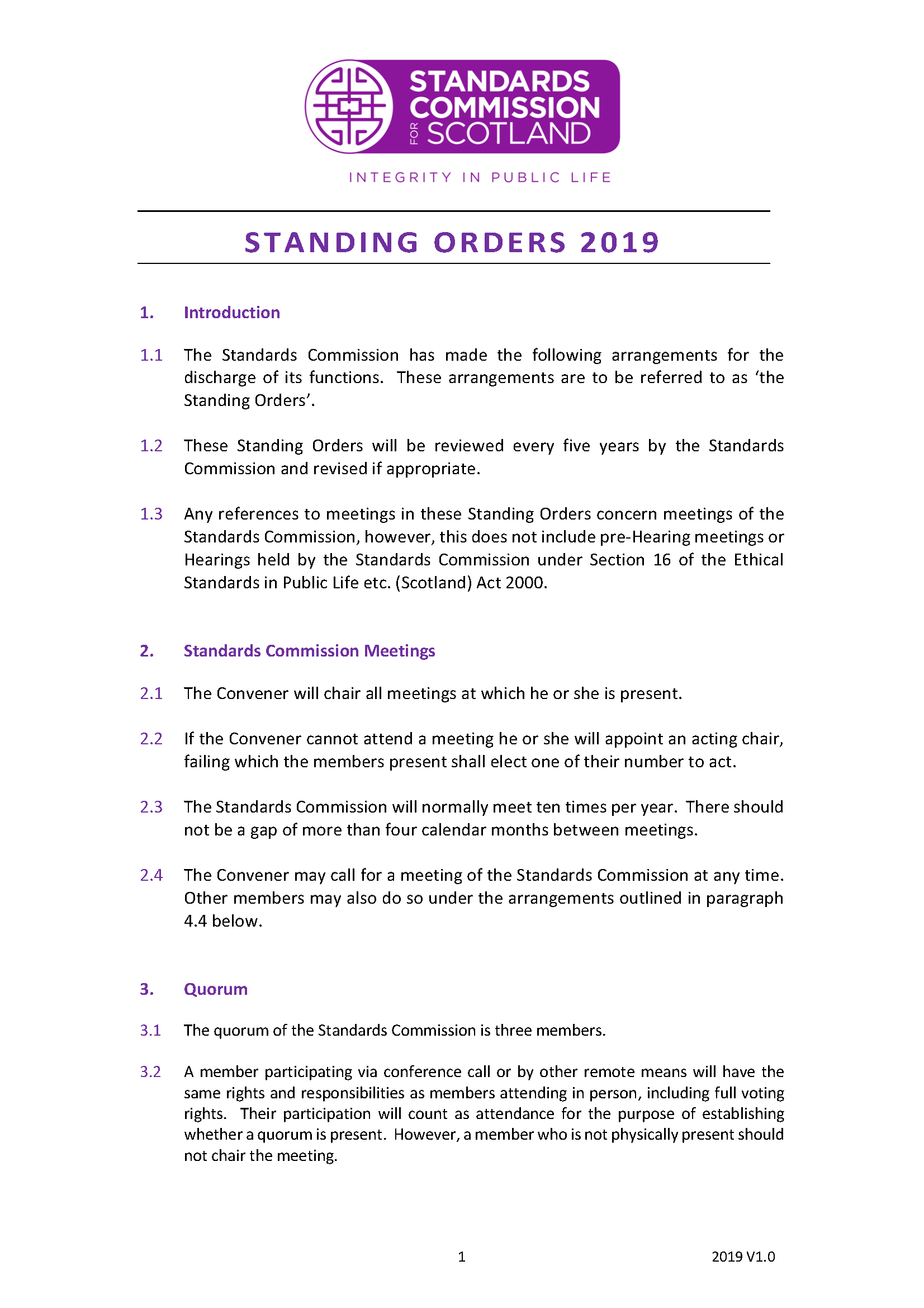 |
Standing Orders2023 |
|
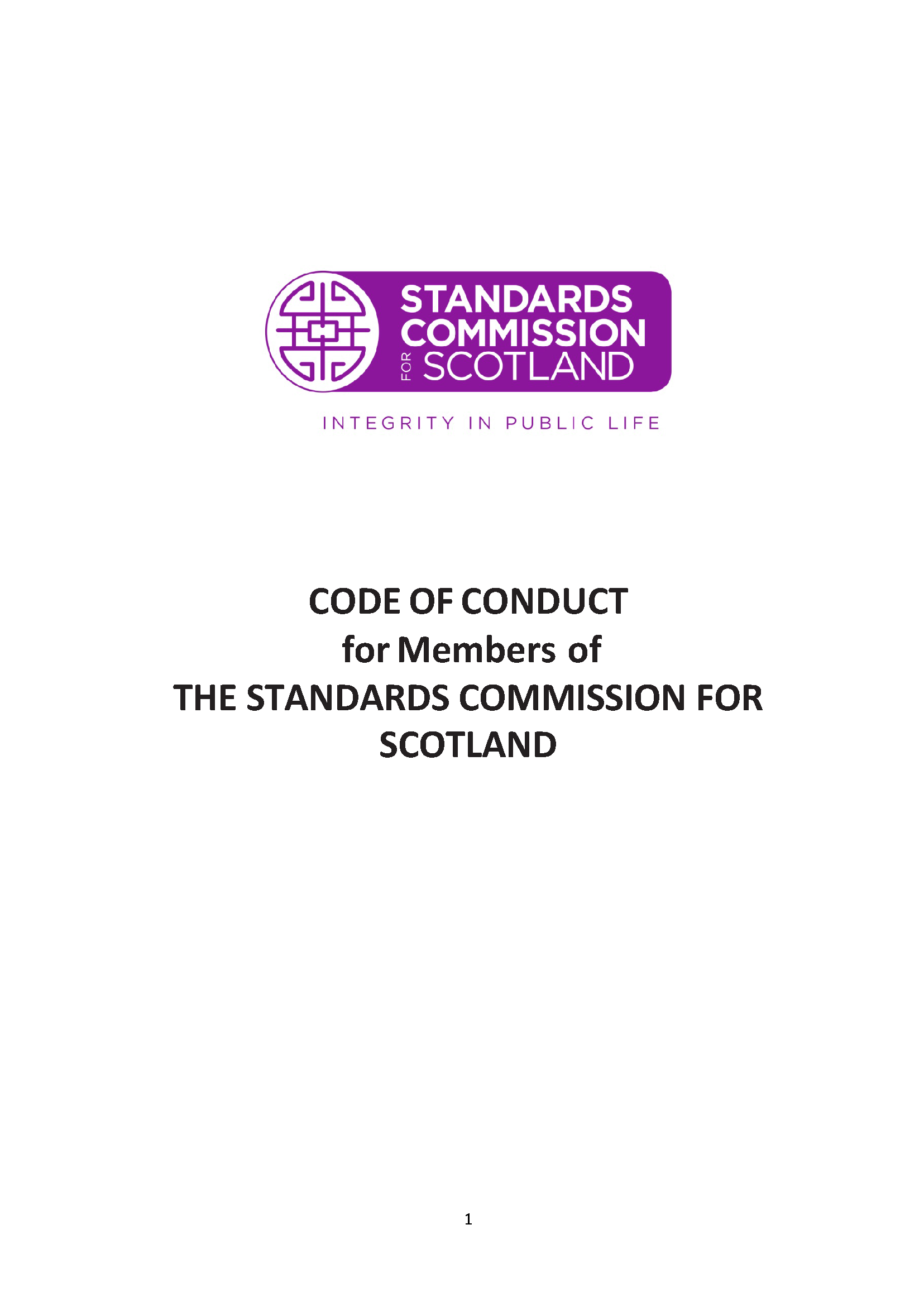 |
Code of Conduct for Standards Commission Members8th February 2022 |
|
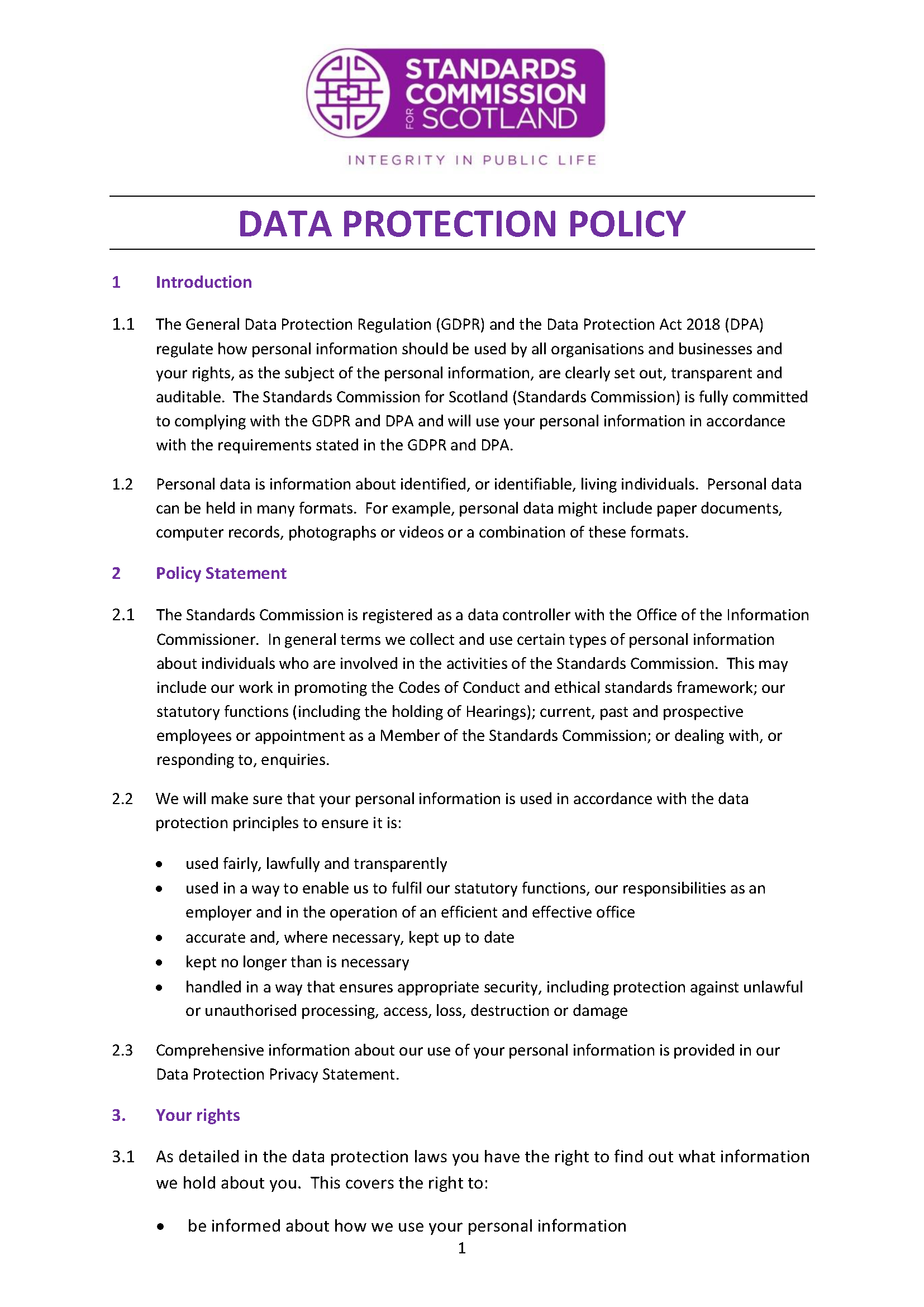 |
Data Protection Policy8th November 2022 |
|
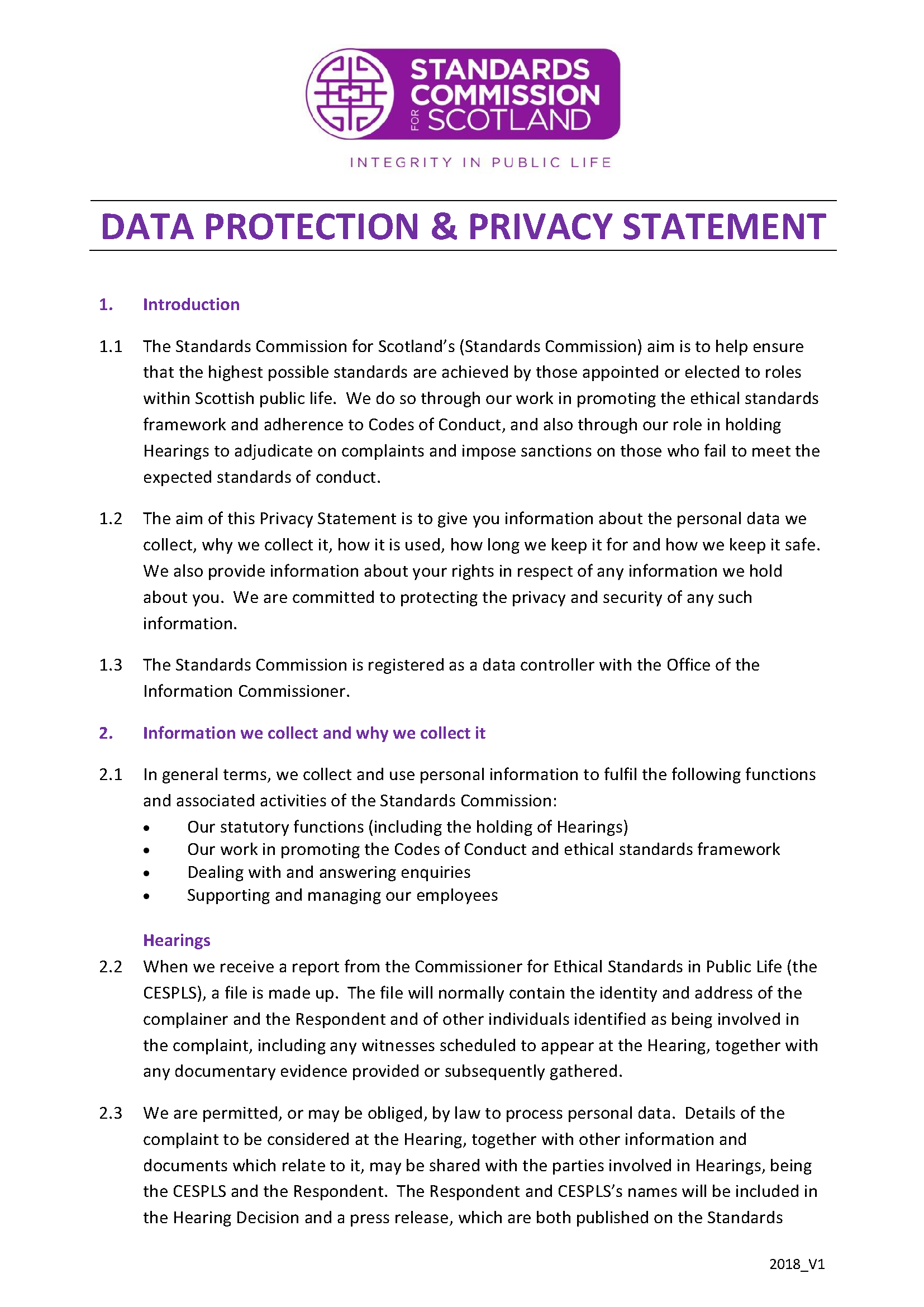 |
Data Protection Privacy Statement8th November 2022 |
|
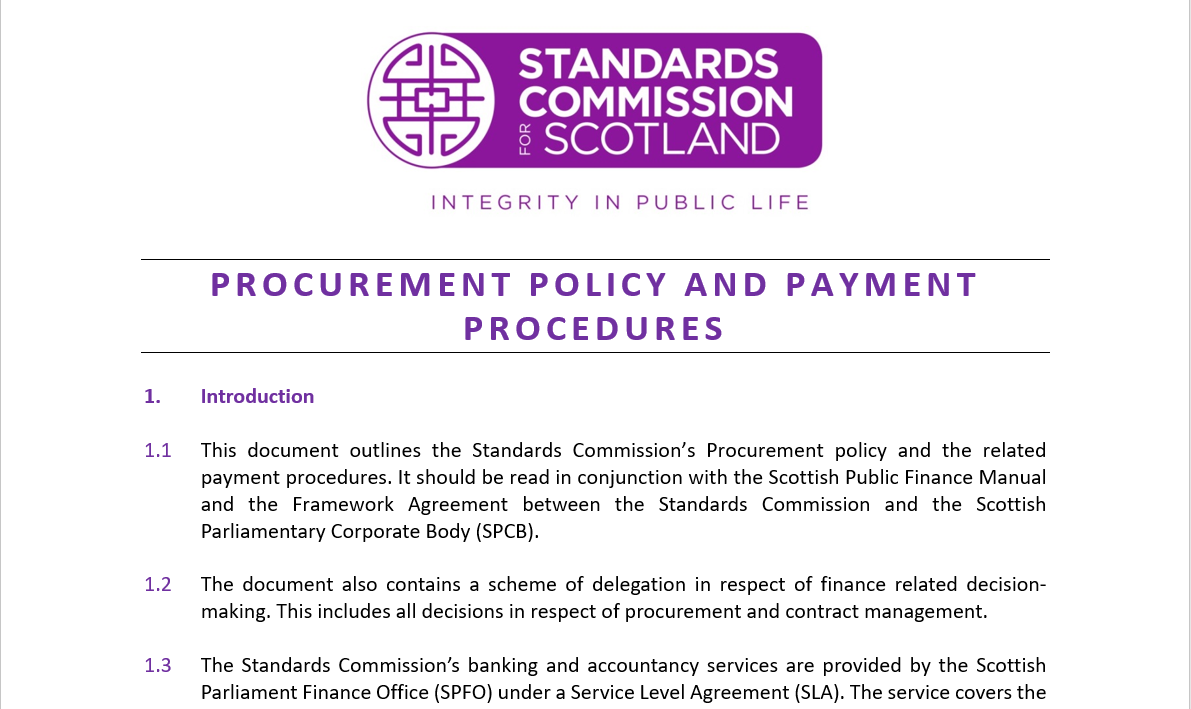 |
Procurement and Finance Policy and Procedures2023 |
|
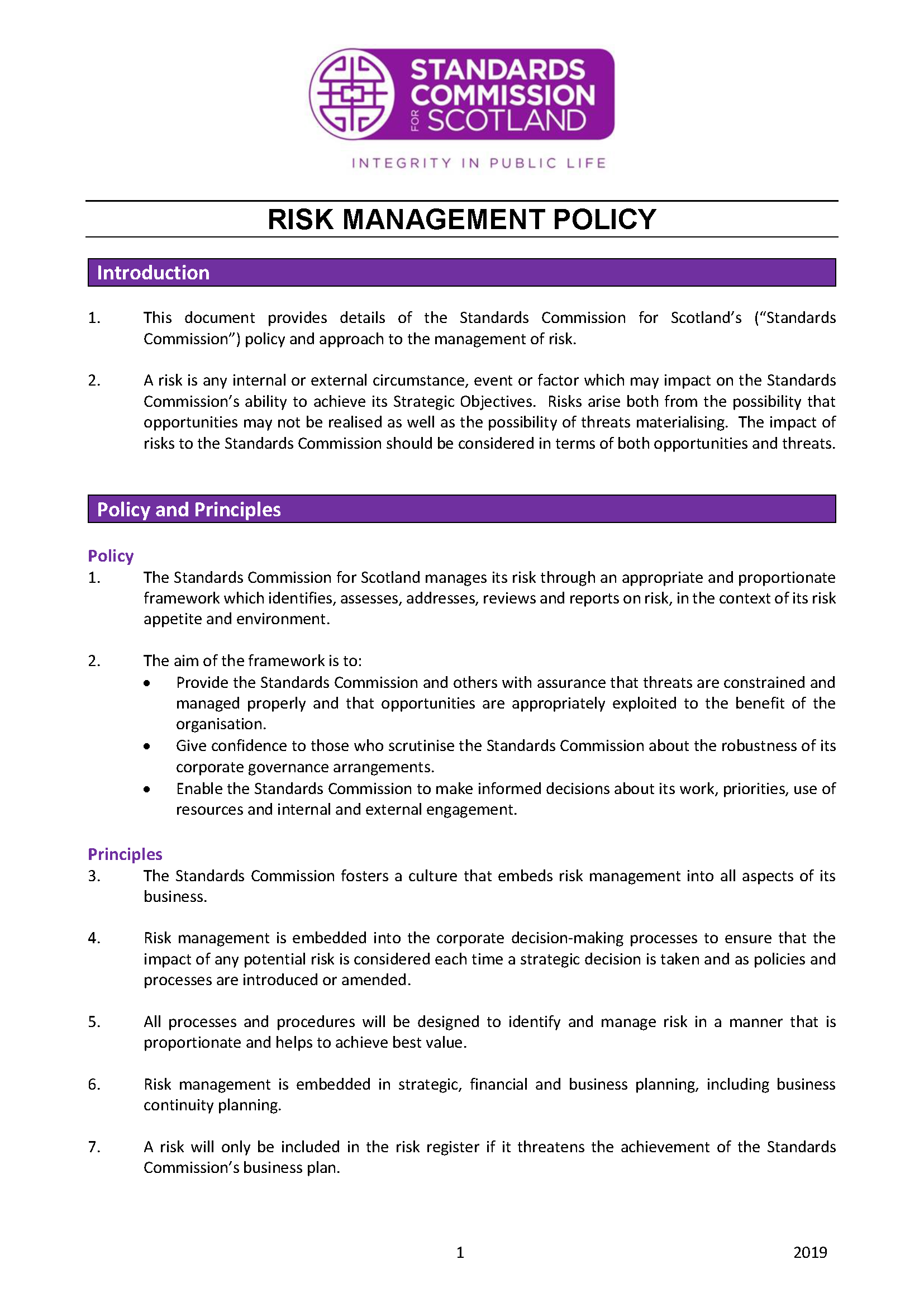 |
Risk Management Policy2023 |
|

